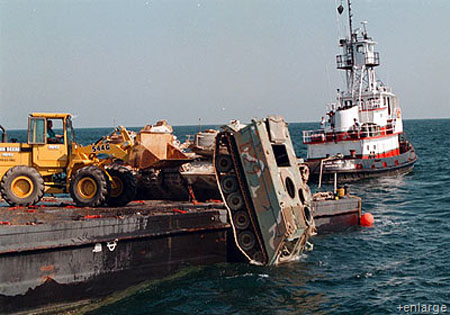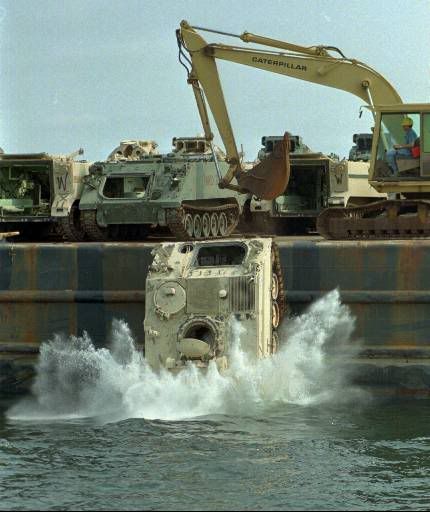
Posted on 01/25/2011 6:24:02 AM PST by decimon
If the U.S. military increases its use of alternative fuels, there will be no direct benefit to the nation's armed forces, according to a new RAND Corporation study.
Any benefits from investment in alternative fuels by the U.S. Department of Defense will accrue to the nation as a whole rather than to mission-specific needs of the military, researchers found. The study is based on an examination of alternative jet and naval fuels that can be produced from coal or various renewable resources, including seed oils, waste oils and algae.
In response to a congressional directive for a study on alternative and synthetic fuels, the U.S. Department of Defense asked RAND to analyze whether alternative fuels can meet the needs of the nation's military in a climate-friendly and affordable manner. RAND also was asked to examine the goals and progress of the efforts of the Army, Navy and Air Force in supporting the development of alternative fuel production technology, and in testing and certifying alternative fuels for military applications.
"To realize the national benefits of alternative fuels, the military needs to reassess where it is placing its emphasis in both fuel testing and technology development," said James Bartis, lead author of the study and a senior policy researcher at RAND, a nonprofit research organization. "Too much emphasis is focused on seed-derived oils that displace food production, have very limited production potential and may cause greenhouse gas emissions well above those of conventional petroleum fuels."
The military also has invested in advanced technology to produce jet fuel from algae-derived oils. According to the study, algae-derived fuel is a research topic and not an emerging option that the military can use to supply its operations.
From the perspective of technical viability, a number of alternative fuels can meet military fuel requirements. But uncertainties remain regarding their commercial viability -- namely, how much these fuels will cost and what effect they may have on the environment, particularly in terms of greenhouse gas emissions.
"The Department of Defense consumes more fuel than any other federal agency, but military fuel demand is only a very small fraction of civilian demand, and civilian demand is what drives competition, innovation and production," Bartis said. "Further, we found that testing and certification efforts by the military services are far outpacing commercial development."
Researchers concluded it makes more sense is for the military to direct its efforts toward using energy more efficiently. Providing war fighters with more energy-efficient equipment such as aircraft or combat vehicles improves operational effectiveness, saves money and reduces greenhouse gas emissions.
The RAND study found that Fischer-Tropsch fuels -- alternative fuels produced via an updated version of a process used by Germany during World War II -- are the most promising option for affordably and cleanly meeting specifications for military fuels. Environmentally sound production requires that carbon dioxide emissions at the production plant be captured and sequestered. With carbon dioxide capture, the study finds that Fischer-Tropsch fuels derived from a mixture of coal and biomass can have lifecycle greenhouse gas emissions that are less than half of those of petroleum-derived fuels.
Most of the defense department's efforts in alternative fuel development are geared toward proving technical viability rather than establishing a process that yields demonstrating affordable and environmentally sound production. The latter two components are notoriously hard to accomplish, as evidenced by the length of the Department of Energy's efforts in fuel cell and solar photovoltaic technology development.
The study's recommendations include:
* The Department of Defense should complete testing and certification of Fischer-Tropsch liquids for use in 50/50 fuel blends, but testing at higher concentrations is not appropriate considering the very limited commercial production anticipated over at least the next decade.
* Minimize resources directed at testing and certification of hydrotreated renewable oils, including oils derived from seed crops (e.g., camelina) and algae. Testing and certifying these fuels in high-performance propulsion systems used by the military is simply not on the critical path for resolving the uncertainties associated with these fuels.
* Considering the absence of military benefits, the Department of Defense and Congress should reconsider whether defense appropriations should continue to support the development of advanced alternative fuel technologies.
* If the Department of Defense is to continue to support alternative fuels, its role and the Department of Energy's role need to be clarified.
* For technical, logistical and security reasons, research directed at advanced concepts for forward-based production of energy should focus on electric power as opposed to specification-grade military fuels for use in weapon systems.
###
The study, "Alternative Fuels for Military Applications," can be found at www.rand.org. The study was co-authored by Lawrence Van Bibber.
Research for this report was sponsored by the Defense Logistics Agency-Energy and was conducted within the Acquisition and Technology Policy Center of the RAND National Defense Research Institute, a federally funded research and development center sponsored by the Office of the Secretary of Defense, the Joint Staff, the Unified Combatant Commands, the Navy, the Marine Corps, the defense agencies, and the defense Intelligence Community.

“If the U.S. military increases its use of alternative fuels, there will be no direct benefit to the nation’s armed forces”
Whodathunkit
The report’s conclusions seem rather obvious once you think about it. What makes any sort of fuel uniquely military? When it comes to POL and substitutes, what are the unique military requirements? I can’t think of any. And besides, who wants to have a specialized fuel industry just for military purposes? And if you design all of your vehicles to operate on special fuels, how can you forage for fuel when your own logistics system isn’t keeping up?
If the U.S. military increases its use of alternative fuels
Another be dupe to the world for profit of a few. They really must think we are stupid.
I assume the photo of the personnel carrier going into the water is to make an artificial reef or something like that....
The vehicle is aluminum, could be recycled
The roadwheels (also aluminum) could be re-used
I think I see an M-60 tank behind the loader
Environmentalists are whacky.
There could be other benefits like making fuel more widely available. But it seems there are no benefits.
I'm against subsidies for alternative fuels but...I think the military is the one viable vehicle, so to speak, for experimentation.
I had read a few year ago they had developed a type of “Mr. Fusion” which enables them to create energy from trash and poop. It actually worked and sounded like a great idea and would enable troops to create fuel in the abscence of resupply from the back line support.
Kind of like carrying “Lifesaver” bottles which can create pure water from any pond, even if it’s polluted like Katrina water.
That’s why I carry the Lifesaver. It enables me to create pure water, on the go, no matter the condition.
Just drop it in the polluted water source and pump up to 6,000 liters. Not bad for one guy in need of H2O but pretty good as he can supply pure water for 4 guys over 1 year.
There are some terrific technologies out there and we should leverage them for their worst case scenario backup.


Actually, it's typically recreational fishermen behind the creation of artificial reefs, and many environmentalists are VIOLENTLY opposed to them (with an assortment of silly arguments such as claiming the reefs don't create new habitat, they just concentrated the available fish so they're easier to catch, etc.)
Very little. Civilian JET-A and military JP-8 are very similar. However, there are military fuels such as JP-6 and JP-7 (designed for the XB-70 and SR-71: very high performance, very high altitude aircraft) and JP-5 (very high flash point, for use aboard aircraft carriers) which have no direct civilian equivalent.
I just have a sneaky suspicion that dumping military vehicles into the sea is part of a federally sponsored project...not recreational fishermen, who drop their reef, and guard the grid coord for their use. I’ve seen environmental groups sink battleships, as artificial reefs...again, if they don’t disclose the grid, its hard for fishermen to use it.
The largest environmentalist sponsored reef project that I know of was a tire reef
http://en.wikipedia.org/wiki/Osborne_Reef
A bunch of hippies on barges dumped millions of tires into the ocean, because they were just darned positive that they would make a great artificial reef. It did the opposite...now nothing at all lives in the area.
Disclaimer: Opinions posted on Free Republic are those of the individual posters and do not necessarily represent the opinion of Free Republic or its management. All materials posted herein are protected by copyright law and the exemption for fair use of copyrighted works.